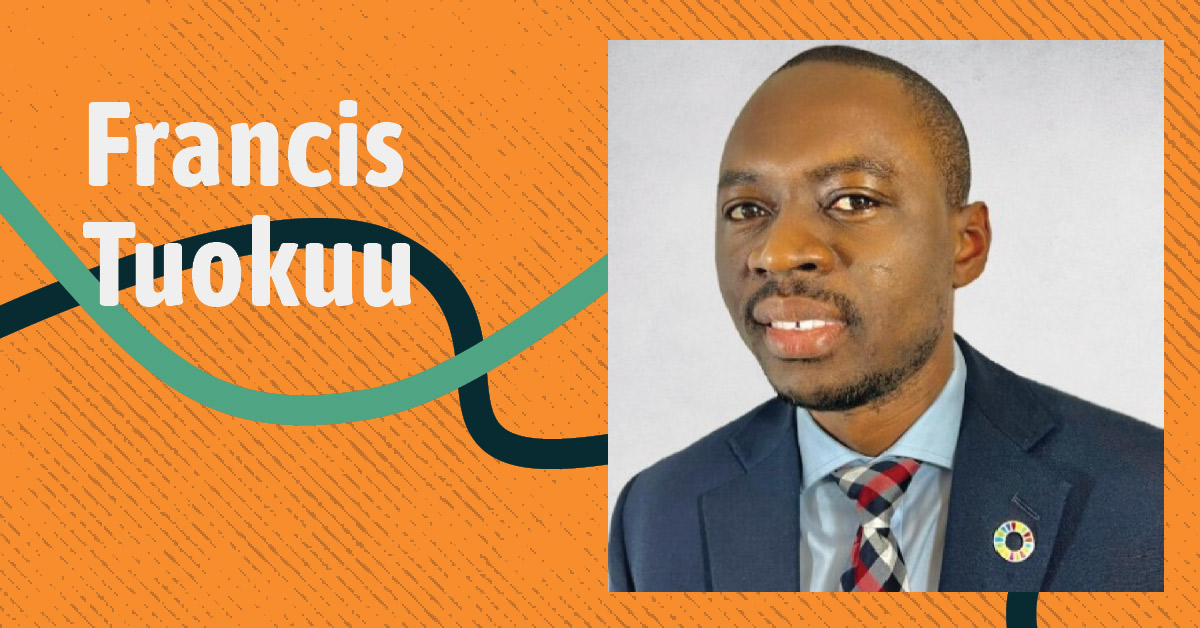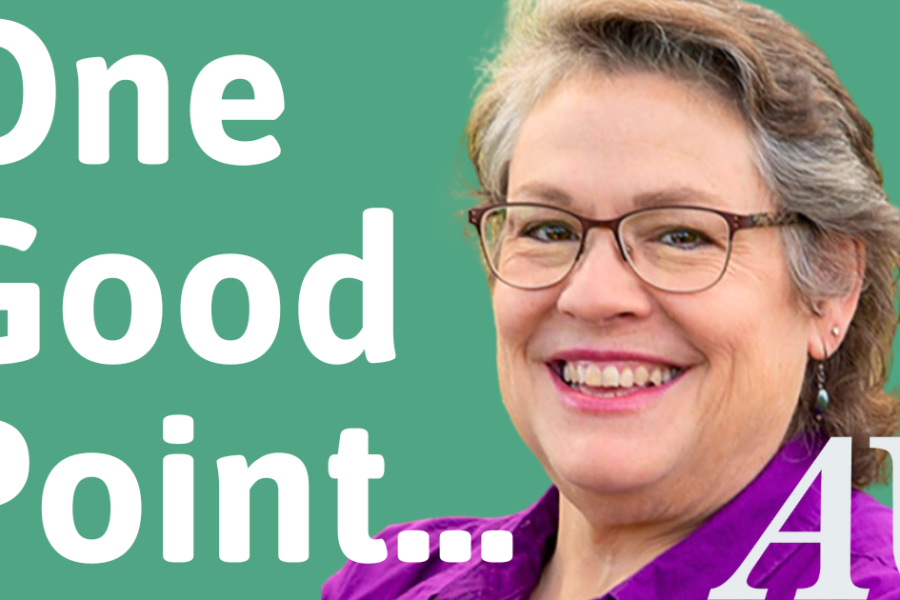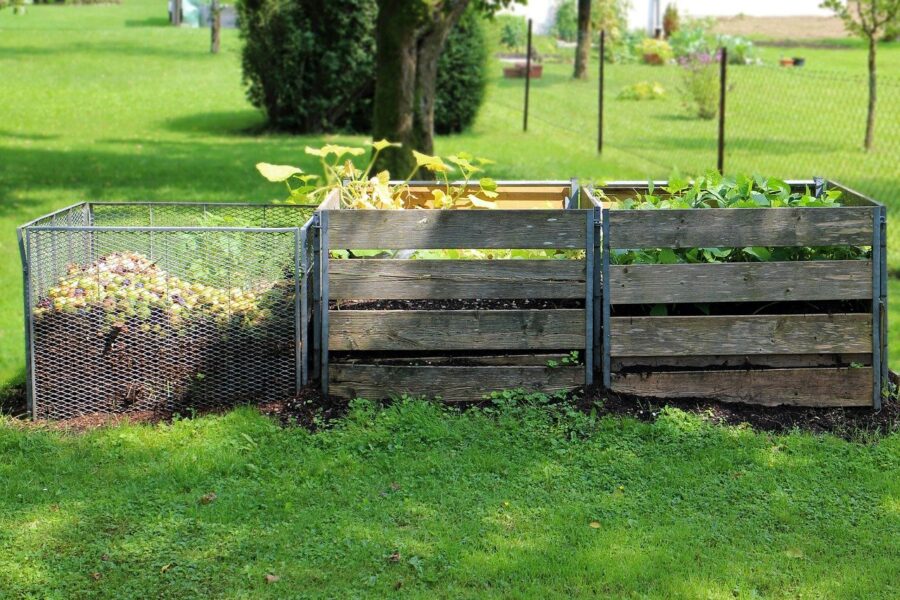Climate change is at emergency status, with global temperatures and extreme weather surging. Facing this, sustainability efforts are more important than ever, both at all levels of government and also for large organizations with vast power and impact. For Francis Xavier Tuokuu, a 2019 graduate of Antioch’s PhD in Environmental Studies, this urgent problem requires taking responsibility. He does that through his role as Senior Advisor for Environmental Sustainability and Safeguarding at Mercy Corps, the global humanitarian crisis aid agency that operates in over 40 countries. In his role at Mercy Corps, Tuokuu recently led the publication of the agency’s first-ever sustainability report, titled “Greening Mercy Corps 2022,” which he says is “the first time an international NGO has monitored, tracked and measured its carbon footprint in its global operations.”
This work requires Tuokuu to collaborate closely with a multitude of colleagues with varying levels of expertise around environmental sustainability. “On a daily basis,” Tuokuu says, “I have meetings with my colleagues in Ethiopia, Kenya, Venezuela, Jordan, Palestine, Iraq, etc., on different projects they’re working on, and they need my technical support to ensure they meet the different donor environmental compliance standards.” These include standards from USAID, Global Affairs Canada, European Union, the UK Government, and others. Tuokuu is the leader of all of the greening and sustainability initiatives within the organization. Organizations, he says, must keep careful track of their emissions if they want to reduce their carbon footprint and act more sustainably. And Tuokuu’s work at Mercy Corps is already influencing other NGOs to track and reduce their carbon footprints.
From Schoolchild in Ghana to Global Humanitarian
As a kid, Francis Tuokuu loved to research and write. Growing up in Ghana in the 1990s, he dreamed of traveling the world, making a difference, and influencing policy with his work. “My parents were my mentors,” he says. “Despite their meager income, they gave me the best education.” He doesn’t take any of this for granted and explains that so much of what he’s been able to accomplish is “thanks to their sacrifice and leadership.”
After graduating from the University of Ghana, he was faced with the difficult task of finding a scholarship for an advanced degree to study abroad. “I kept pushing hard and applying, and, in the end, I won a full scholarship to pursue a master’s degree in the UK,” Tuokuu says. He attended The Robert Gordon University, in Aberdeen, Scotland, for his Masters in Corporate Responsibility & Energy. His lifelong love for knowledge guided him to continue seeking new opportunities to either learn new skills or deepen his knowledge. From Scotland, he moved to the U.S., where he enrolled at Antioch University’s New England campus for his PhD in Environmental Studies, graduating in 2019. And today, he is enrolled in Harvard Kennedy School’s Executive Education Program, Public Policy option.
In Tuokuu’s career, he’s able to apply specific subjects that he studied at Antioch, such as weather conservation, sustainability, and environmental policy. “It opened my mind to different issues,” Tuokuu says of his coursework. The focus of his PhD work at Antioch assists him every day in his career, especially the field work, and service. “My job involves a lot of traveling. I just returned from Ethiopia,” Tuokuu says. “When you go to the field, and you see that the work you are doing is having an impact on the people on the ground, it is really fulfilling.”
“Our graduates are uniquely capable of advancing sustainable solutions to environmental challenges,” says Jason Rhoades, the Associate Director of the PhD in Environmental Studies. “Francis Tuokuu’s work with Mercy Corps and his central effort in their first sustainability assessment is exemplary of the kind of impact that Environmental Studies PhD alums have.”
Learning to lead is part of the education Tuokuu received at Antioch University. The PhD in Environmental Studies built expertise around environmental policy, sustainability, and natural resource management. It also gave him the essential skills like communication, diplomacy, and negotiation needed for a successful career that would have an impact on climate change. Fieldwork and service have prepared him for the world of humanitarian and international development work.
Returning to Ghana as an Environmental Crusader
While at Antioch, Tuokuu returned to Ghana for a service-learning project, which is a requirement for the PhD program. He chose to do an internship with the mining sector in Ghana’s Environmental Protection Agency (EPA).
“The country has been mining gold and other precious minerals such as diamonds, bauxite, and manganese for several centuries,” Tuokuu says. “Yet there is very little to show for it, regarding socio-economic benefits to the people.” Instead, he says that what remains is largely the fall-out of mining. “There is pervasive degradation of the environment, such as soil contamination and air and water pollution.”
Tuokuu found that the policies intended to protect the environment and its citizens were not being followed, and he became passionate about effectively implementing these policies not only in his home country but around the world. “I also learned about the challenges and opportunities of environmental policy implementation,” he says, “and how I can use my research to influence policy decisions at the national and sub-national levels.”
Writing, Research, and Teaching as Activism
Tuokuu’s favorite part of being a student at Antioch was going into the field, collecting and analyzing data, as well as writing papers. His passion for data collection and analysis has extended to many roles. He has worked in teaching positions in several universities in the UK, Canada, and the United States, including as an Adjunct Faculty at Antioch University’s New England campus. When he taught at Antioch, he developed a class on participatory action research, which he teaches to master’s students.
His position at Mercy Corps puts Tuokuu at the forefront of sustainability initiatives in the over 40 countries where the organization works. Mercy Corps plans on a 50% reduction in its carbon footprint by 2030. To do this, they have confirmed a baseline, set up a tracking system, and set priorities within the company which will have the most dramatic impact.
To accomplish their goals, Mercy Corps has set up Green Teams, local level initiatives led by employees to promote sustainability within country and field offices. These Green Teams are focused on creating behavioral changes such as turning off the lights when daylight is available, planting trees, reducing/recycling, and converting offices to solar energy.
Mercy Corps is also devoted to reducing its employees’ air travel, instead encouraging travel by train whenever possible. During COVID-related travel restrictions, they learned that they could decrease emissions by taking advantage of digital platforms. Mercy Corps now conducts a greater portion of its business remotely as a way to reduce environmental impact.
Analyzing their supply chain and looking for ways to reduce emissions is another priority. Mercy Corps is transitioning from fuel-powered vehicles to hybrids as well as minimizing mileage overall. These are just a few ways that Mercy Corps is reducing its carbon footprint, with Tuokuu leading the way.
“Antioch has really prepared me for this type of work,” Tuokuu says, noting that it’s a great place of learning where he is proud to teach. “All the theoretical concepts I learned at Antioch, I’m applying them to solve real-world problems on the ground. And it’s really, really great to do such work.”





